A notorious LAPD settlement, revisited: HBO’s role in clearing an L.A. man’s name
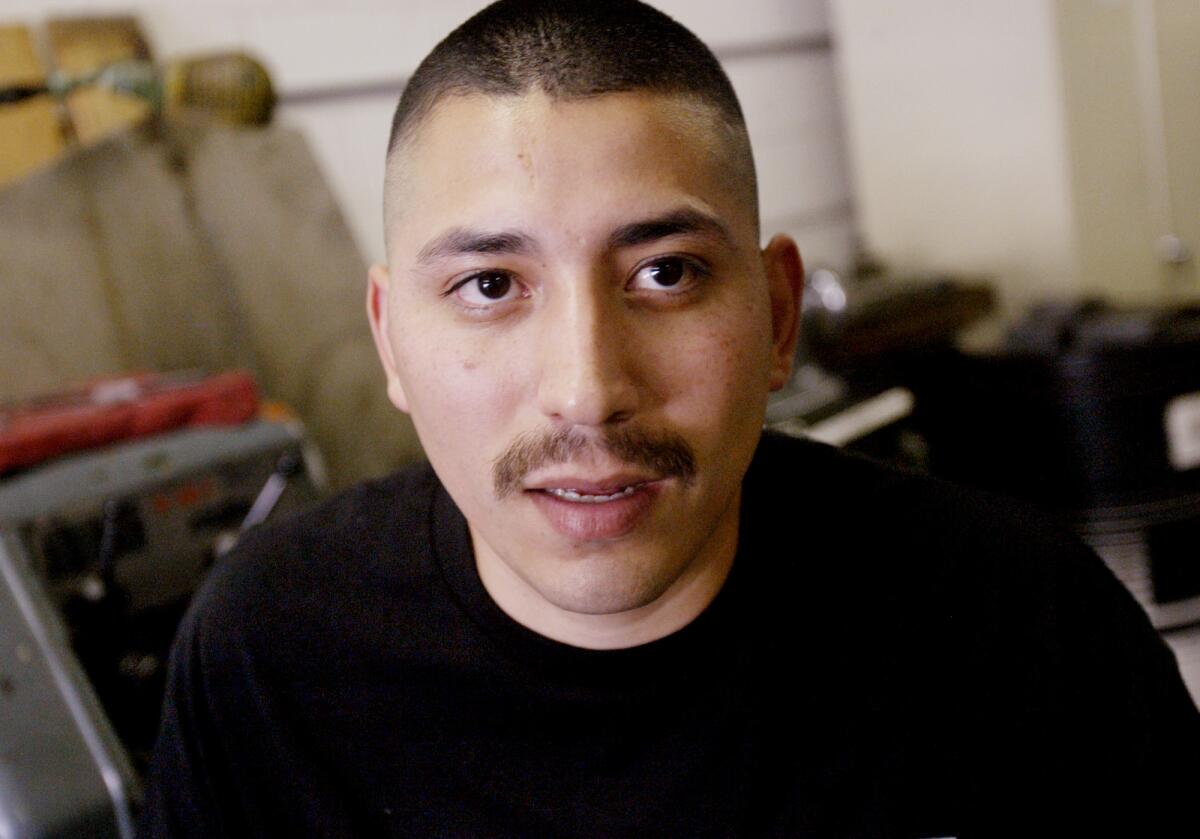
Good morning, and welcome to the Essential California newsletter. It’s Thursday, April 7. I’m Justin Ray.
This is part two of my series on the death of Martha Puebla, and the subsequent arrest of Juan Catalan. Here’s part one, which was sent to subscribers of this newsletter yesterday with the subject line, “A notorious LAPD settlement, revisited.”
Based on sources, detectives suspected that Juan Catalan —brother of Mario Catalan, who fled to Tijuana with fellow Vineland Boyz gang member Jose Ledesma — was behind the murder of 16-year-old Martha Puebla. He was arrested and jailed, yet he claimed that he was innocent and had been at a Dodgers game with his 6-year-old daughter at the time of the killing. But police told Catalan they had a witness who put him at the crime scene.
Catalan was able to produce ticket stubs, but his lawyer, Todd Melnik, knew that would only prove that someone had bought tickets, not necessarily that Catalan had been at the stadium. Melnik then tried to prove that Catalan actually attended the game by looking through television footage of the game. However, that didn’t end up being fruitful.
However, Catalan did eventually remember one more detail about that day, according to MLB.com. Someone in his section said that “Super Dave Osborne” — actor and comedian Bob Einstein, who plays Marty Funkhouser on “Curb Your Enthusiasm” — was in attendance.
This caused Melnik to reach out to the Dodgers’ media relations department, which oversees filming at the stadium. A phone number was listed. Melnik called it, and a person picked up the phone and said, “HBO.”
He asked if he could view their stadium footage for the show, which had not yet aired. The television network agreed and quickly spotted Catalan in the corner of a frame. “Lo and behold, there’s my client, his daughter and two friends,” Melnik previously told The Times. “I jumped out of my chair.”
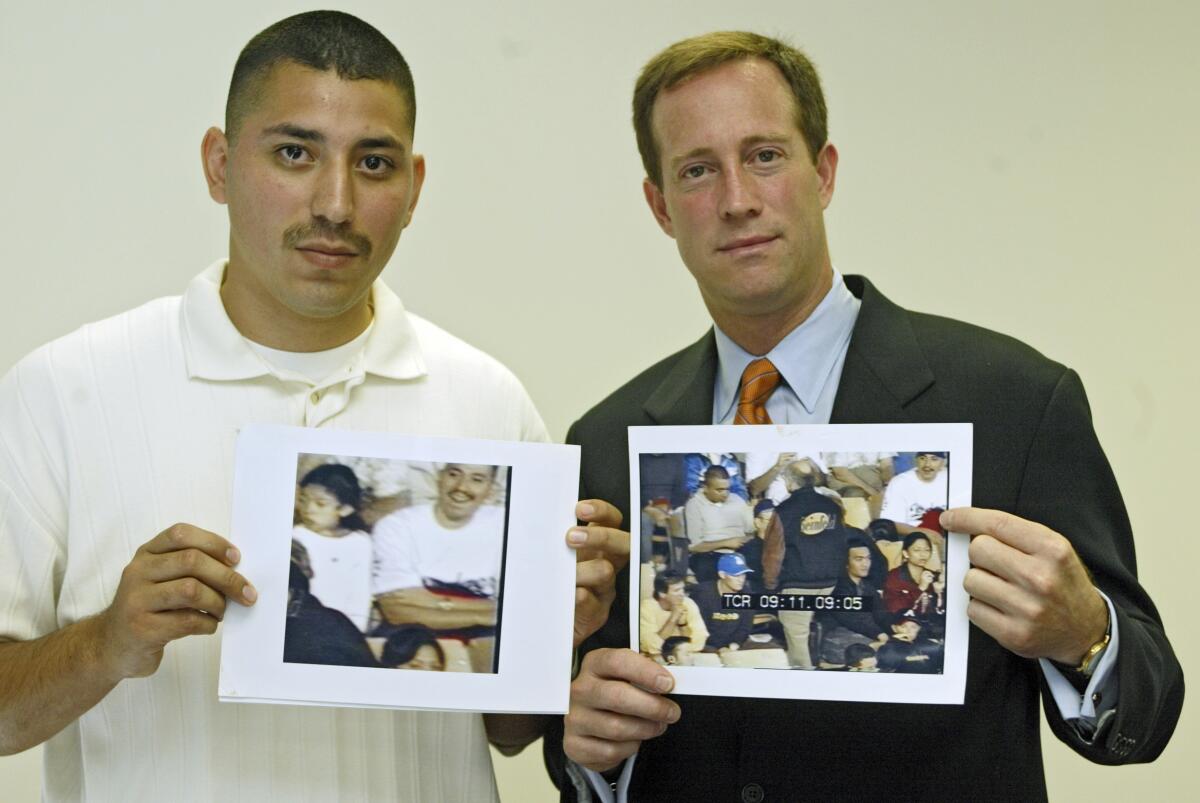
The film had time stamps showing that it was 9:10 p.m., about an hour before the shooting occurred. This, paired with cellphone records that showed that Catalan was still in the vicinity of Dodger Stadium at the time of the killing, caused a judge to dismiss the case when presented with the evidence.
However, Catalan already had spent five months in jail after being arrested in front of his young, crying daughter. After a police misconduct suit against the city, the Los Angeles City Council agreed to pay $320,000 to settle.
***
But the story doesn’t end there.
The truth is, the “six-pack” — a pack of mug-shot photos purportedly bearing Puebla’s signature, which police presented to Ledesma, while they were interrogating him over the killing of Christian Vargas — was fake: Law enforcement officers had falsified Puebla’s identification. Juan Rodriguez, the partner of LAPD homicide detective Martin Pinner, had circled Ledesma’s photo and forged her statement and signature (this is legal, but controversial).
Even worse, we must return to a phone call that Ledesma made while incarcerated, which is perhaps the most troubling part of this case.
“Cokester,” Ledesma said during the call, referring to his friend Javier Covarrubias by a gang moniker, “do you know the slut that lives there by . . . my house? Her name starts with an M . . . I need her to disappear. She is dropping dimes…. But [keep a] low-pro[file]. . . . Stay on your toes, homie. And don’t get caught.” (“Dropping dimes” means revealing information.)
Pinner said in sworn testimony that the phone call’s content remained unknown until January 2005, when during preparation for Ledesma’s trial for Vargas’ slaying — more than two years after the recording was made — Spanish-speaking LAPD officers listened to it.
Had they understood what was said on the call sooner, not only would detectives have known about the plot and possibly could have foiled it, they also could have identified who was actually behind the crime and wouldn’t have cost taxpayers hundreds of thousands of dollars and left a scar on a man’s life that will last forever.
In 2008, Vineland Boyz gang member Raul Robledo was sentenced to life in the murder. Ledesma and Covarrubias admitted their roles in Puebla’s death and are serving life sentences, according to The Associated Press. Los Angeles County prosecutor Beth Silverman was nicknamed “Sniper” because she had never lost a murder case, according to LA Magazine. It isn’t clear if Juan Rodriguez still works for the department.
Puebla’s parents understandably filed a lawsuit against the city. A federal jury did find that the two detectives were negligent over the photo ruse. However, jurors found that Puebla and her parents were 80% responsible for her death and the detectives were 20% at fault. The family was awarded $1.
The case has attracted media attention and was the subject of a 2017 Netflix documentary. Its popularity is perhaps due to the made-for-TV twist that led to Catalan’s case being dismissed: What if he hadn’t gone to the game? As Melnik previously told The Times, “If he’d stayed home and watched the game on television, he’d have been in big trouble.”
This story reveals ugly truths about the criminal justice system. It reminds me of a story I once wrote about a person who was convicted of murder, but I described it in a way that implied he might not have done it. An editor deleted the description, telling me that if a person has been found guilty, they did it. I think a lot of people believe that nonsense. I think they do so because they want to believe that our criminal justice system is perfect, rather than accepting that we incarcerate (and sometimes execute) innocent people, break apart families, and cost taxpayers millions in settlements.
I think this story also shows that often it’s not enough to be innocent; you also have to be lucky. It leads me to ask: How many other Juan Catalans are there?
And now, here’s what’s happening across California:
Note: Some of the sites we link to may limit the number of stories you can access without subscribing.
Sacramento police said Wednesday that it appears that at least five shooters fired guns during Sunday’s massacre in the city’s downtown, which killed six people and injured 12. Officials are still trying to determine the motive for the violence but said in a statement that “it is increasingly clear that gang violence is at the center of this tragedy.” Sunday’s shooting has also renewed calls among California officials, city leaders and activists for new crime-prevention and gun-control legislation that they say could help prevent more bloodshed. Los Angeles Times
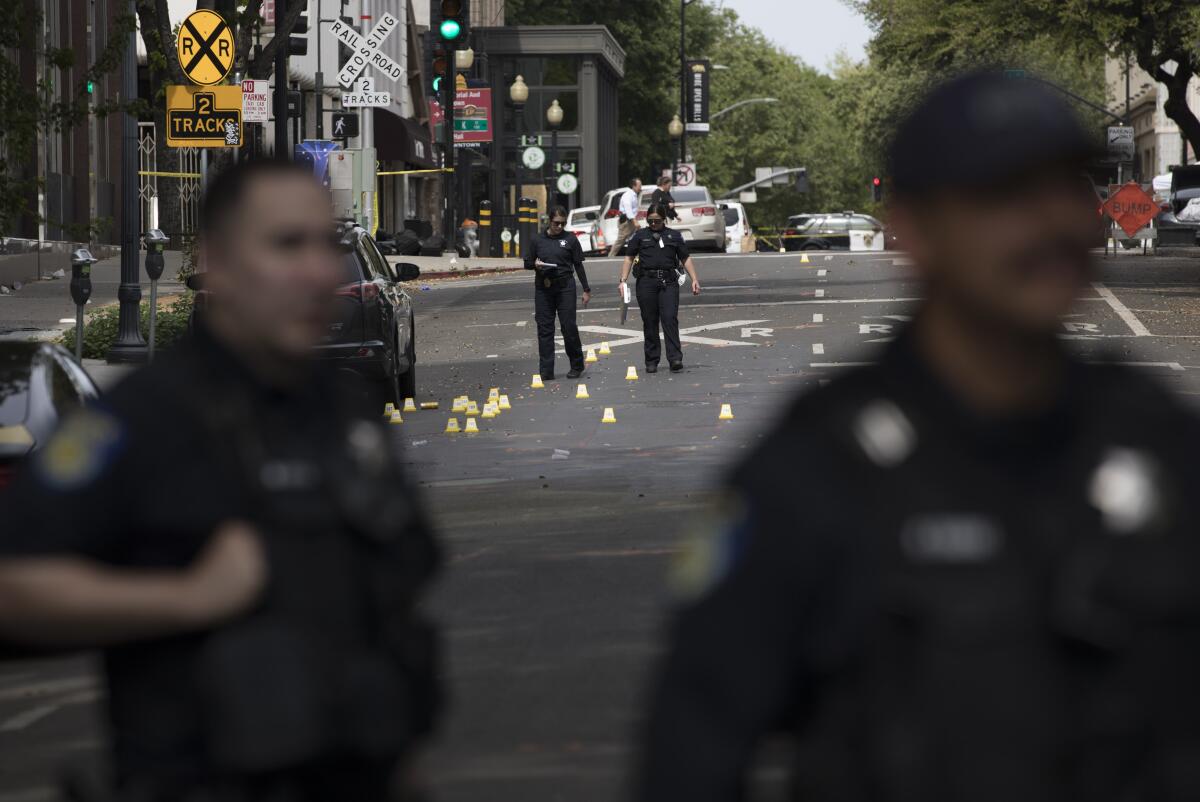
L.A. STORIES
Report details LAPD officer’s gun battle with a burglar. As off-duty officer Michael Beyda wrestled with the burglar who had just shot him multiple times, a terrifying thought passed through his head: “This is what death feels like.” Los Angeles Times
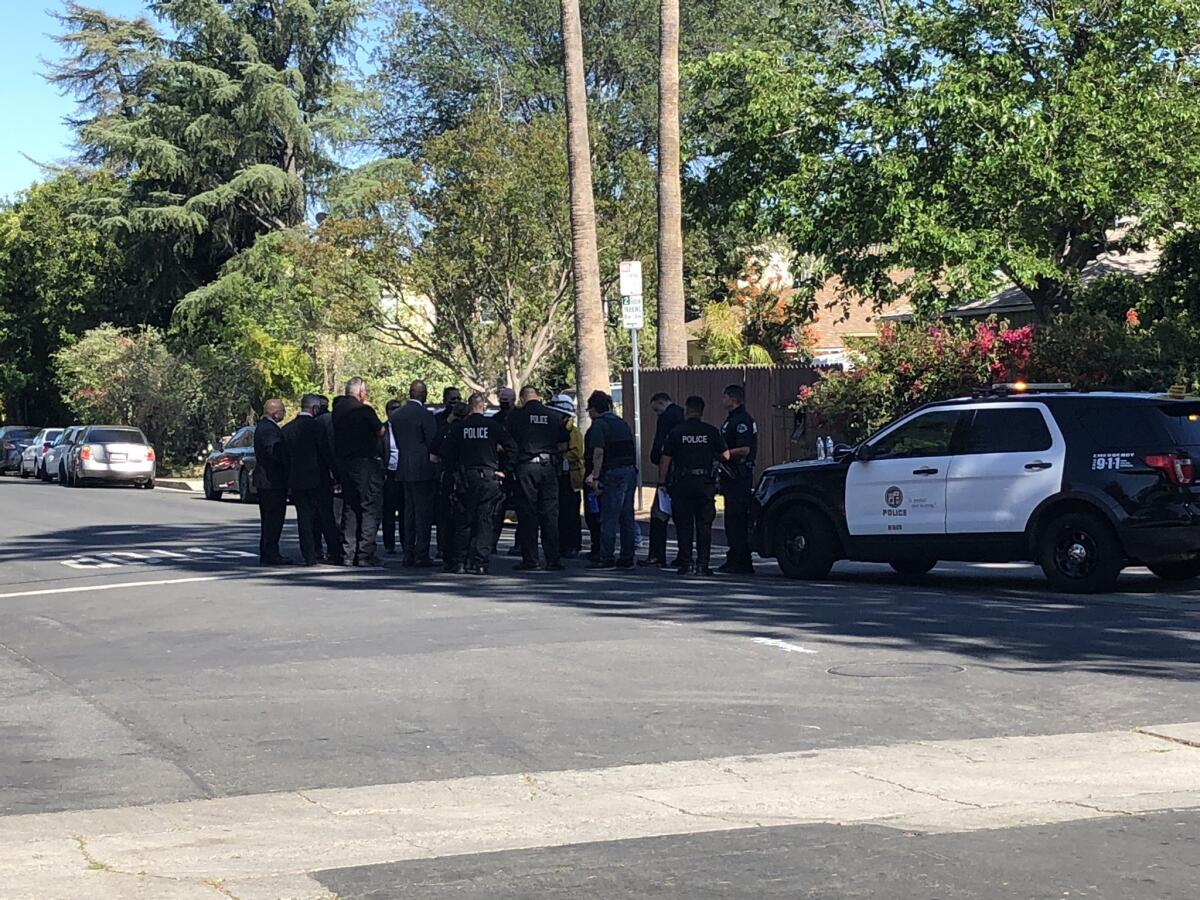
Our daily news podcast
If you’re a fan of this newsletter, you’ll love our daily podcast “The Times,” hosted every weekday by columnist Gustavo Arellano, along with reporters from across our newsroom. Go beyond the headlines. Download and listen on our App, subscribe on Apple Podcasts and follow on Spotify.
POLITICS AND GOVERNMENT
The backlash against secret surveillance of San Diego residents finally led to new legislation Tuesday when the City Council unanimously approved the creation of a new privacy advisory board that will evaluate all future surveillance proposals. The uproar took place after the city installed thousands of special streetlights five years ago that were secretly equipped with sophisticated surveillance tools including cameras and microphones. San Diego Union-Tribune
A tax shelter was created in 2017 for the wealthiest Americans on the promise it would bring opportunity to the most downtrodden places. Instead, it’s been a windfall for the rich. Billions of dollars’ worth of tax breaks for the wealthy are being generated by the Opportunity Zone program, often in pursuit of luxury high-rises, high-end hotels and swank office space. It has subsidized hulking self-storage units nestled alongside freeways and upmarket apartments for employees of the hottest Bay Area tech firms. One thing the tax break has fallen short on is creating opportunities in low-income communities. Los Angeles Times
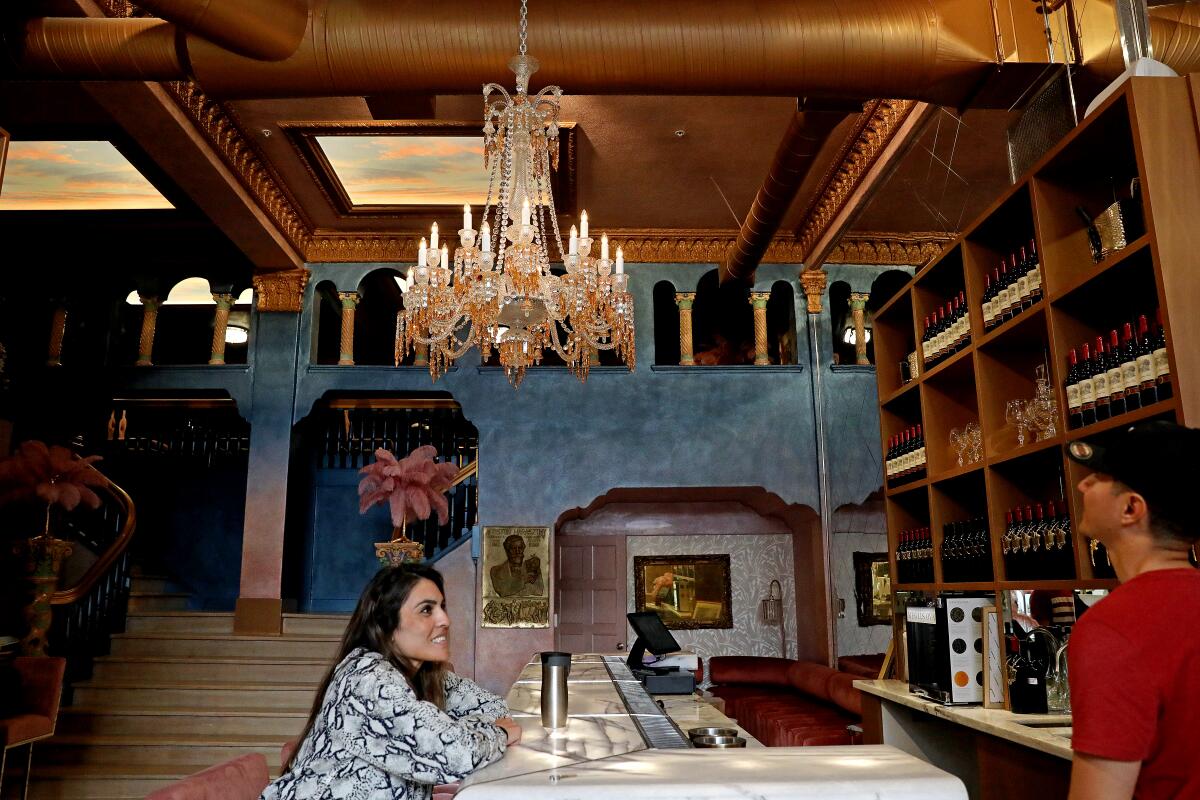
CRIME, COURTS AND POLICING
A federal judge signaled today that former Police Chief Anne Kirkpatrick’s lawsuit against the city of Oakland can proceed to a trial by jury later this year unless a settlement is reached before then. Kirkpatrick was fired in early 2020 by the Police Commission, a civilian board created in 2016 “to provide additional oversight to the Oakland Police Department, and Oakland Mayor Libby Schaaf.” A specific reason was not given for her dismissal, but one wasn’t required. Soon after she was let go, Kirkpatrick claimed that the commission retaliated against her for trying to blow the whistle on allegedly illegal activities by its members. Kirkpatrick filed her lawsuit in August 2020. Oaklandside
Two women who had been reported missing after they didn’t return home from a wedding on Sunday were found dead inside a vehicle in a river. Alyssa Ros, 23 of Long Beach and Xylona Anita Gama, 22, of Stockton were last seen Sunday evening at Spring Creek Country Club. Police announced Wednesday that a Spring Creek employee found one of the women’s vehicles submerged in the Stanislaus River near a southeastern part of the golf course Tuesday. Modesto Bee
Support our journalism
HEALTH AND THE ENVIRONMENT
Californians can now use their library cards to visit state parks for free. California State Parks and the California State Library today announced that starting this week — National Library Week — California State Parks will be distributing the California State Library Parks Pass to public libraries across the state for checkout by library patrons. The new pass will allow free vehicle day use entry at more than 200 participating state park units. (Here’s what else your card can do). California Department of Parks and Recreation

CALIFORNIA CULTURE
UC and CSU deliver thousands of rejection letters. Arizona State wants to fill the void. After years of steadily targeting California, the No. 1 source of ASU’s out-of-state students, the university has planted its first flag in the heart of downtown with a high-profile, multimillion-dollar takeover of the landmark Herald Examiner Building. Here’s what we know about the university. Los Angeles Times
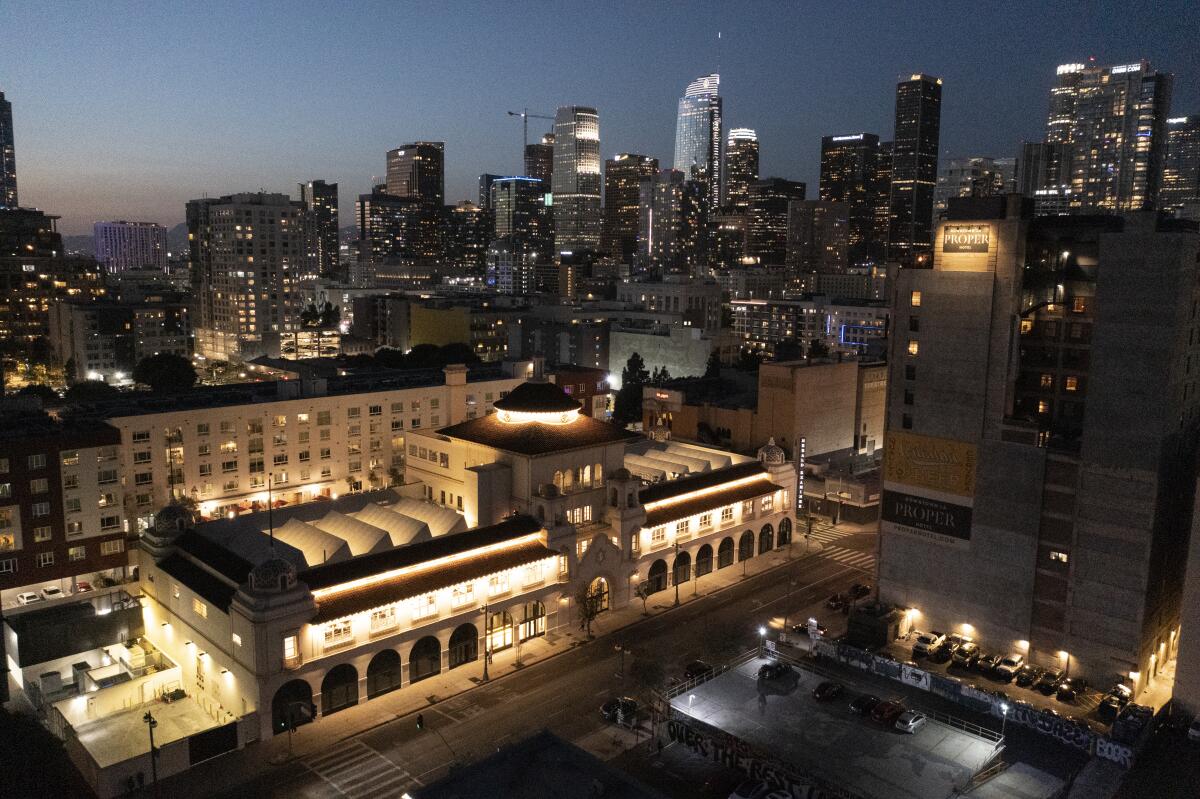
Free online games
Get our free daily crossword puzzle, sudoku, word search and arcade games in our new game center at latimes.com/games.
CALIFORNIA ALMANAC
Los Angeles: Sunny 94 San Diego: Sunny 86 San Francisco: Overcast 83 San Jose: Overcast 94 Fresno: Sunny 95 Sacramento: Overcast 91. I love Snickers.
AND FINALLY
Today’s California memory is from Diane Vermeulen Johnson:
I was born in St. Joseph Hospital in Orange in 1958 and lived on the Irvine Ranch until I was 6 years old. We moved to the sleepy little town of San Juan Capistrano. We had to get cable TV because we lived too far from either L.A. or San Diego to get reception on our antenna. Of all the old shows my favorites were “Hobo Kelly” and “Winchell-Mahoney Time” broadcast from Los Angeles. Great memories with my little brother Donnie and my disapproving older brother Brian, ha!
If you have a memory or story about the Golden State, share it with us. (Please keep your story to 100 words.)
Please let us know what we can do to make this newsletter more useful to you. Send comments to [email protected].
Sign up for Essential California
The most important California stories and recommendations in your inbox every morning.
You may occasionally receive promotional content from the Los Angeles Times.




